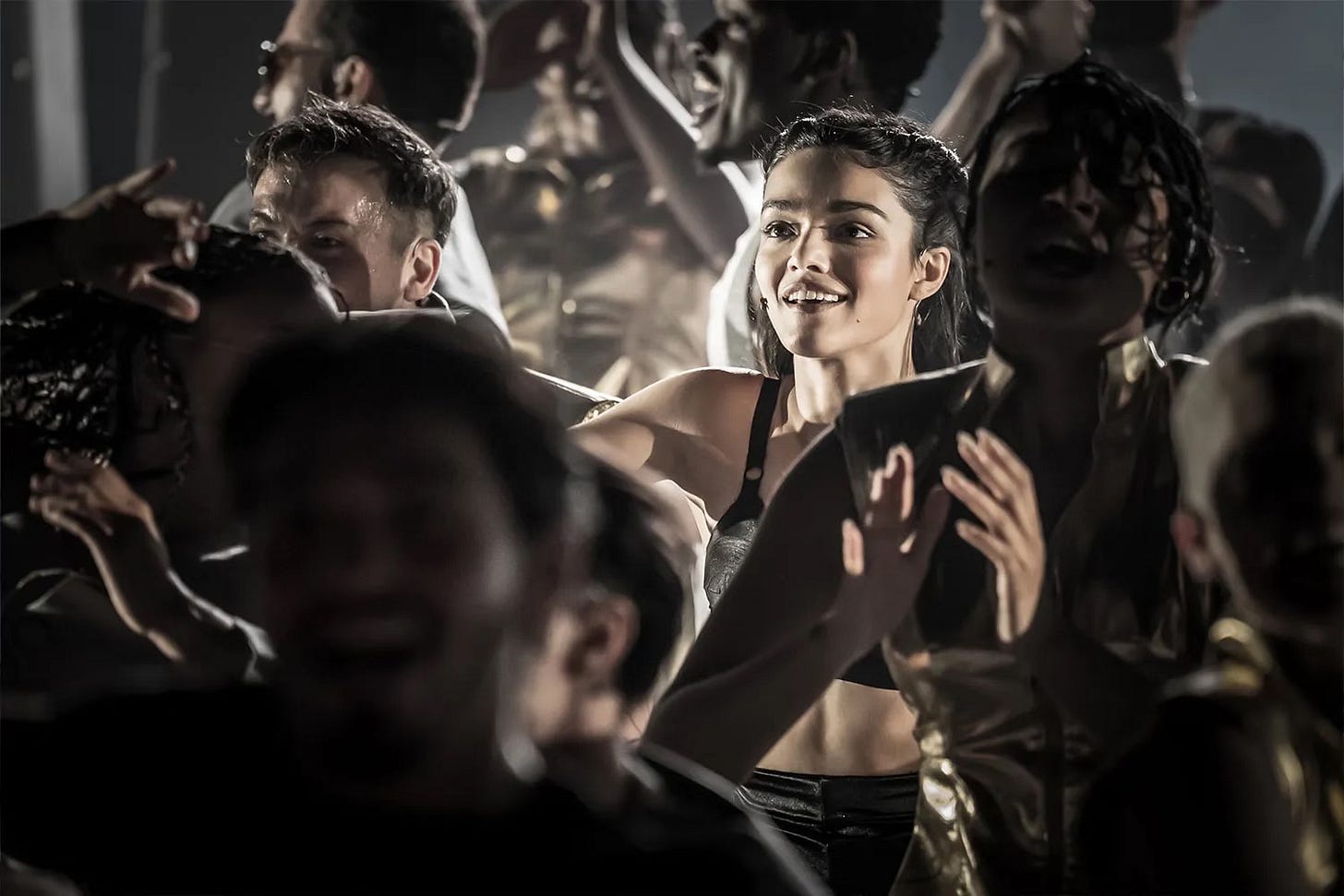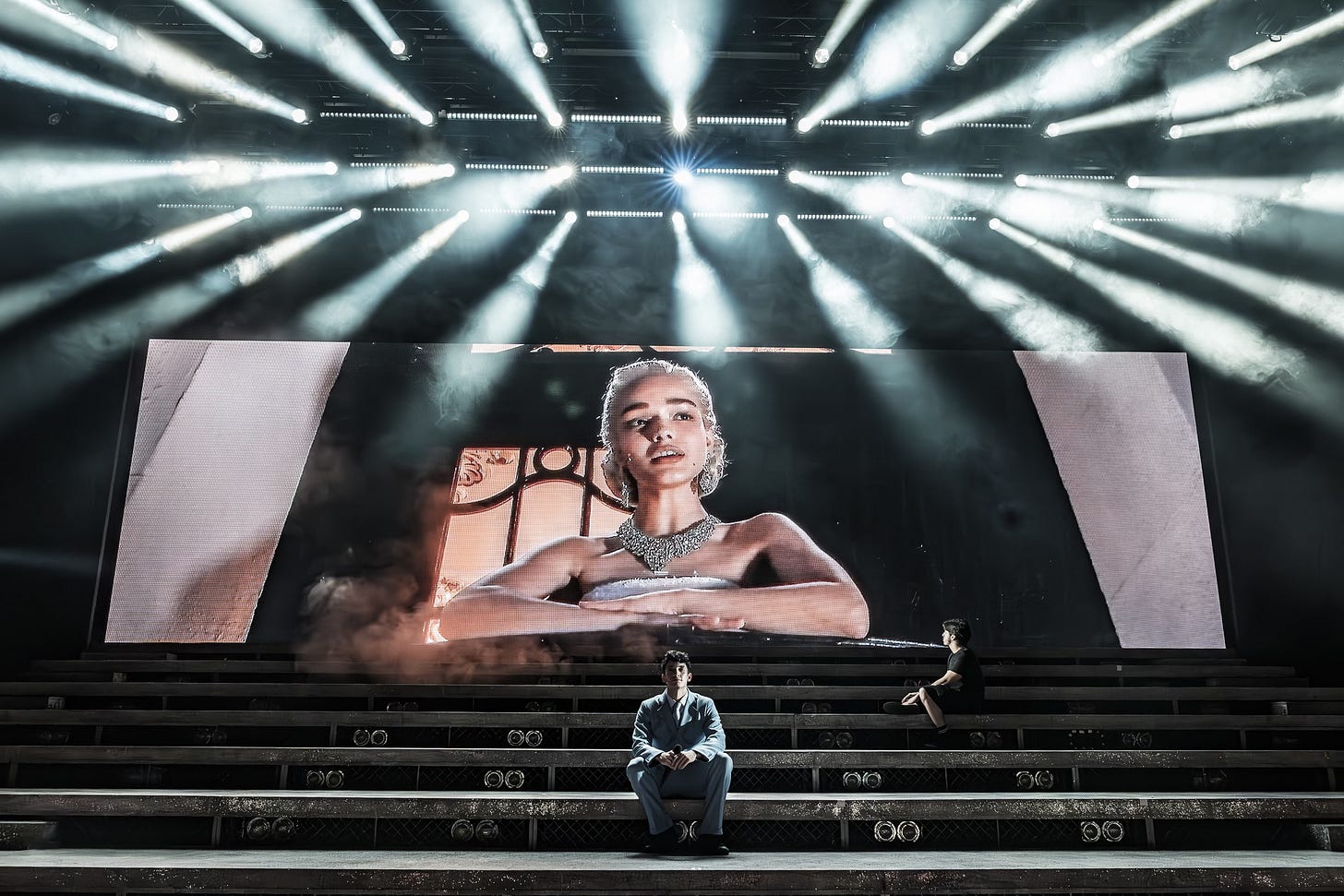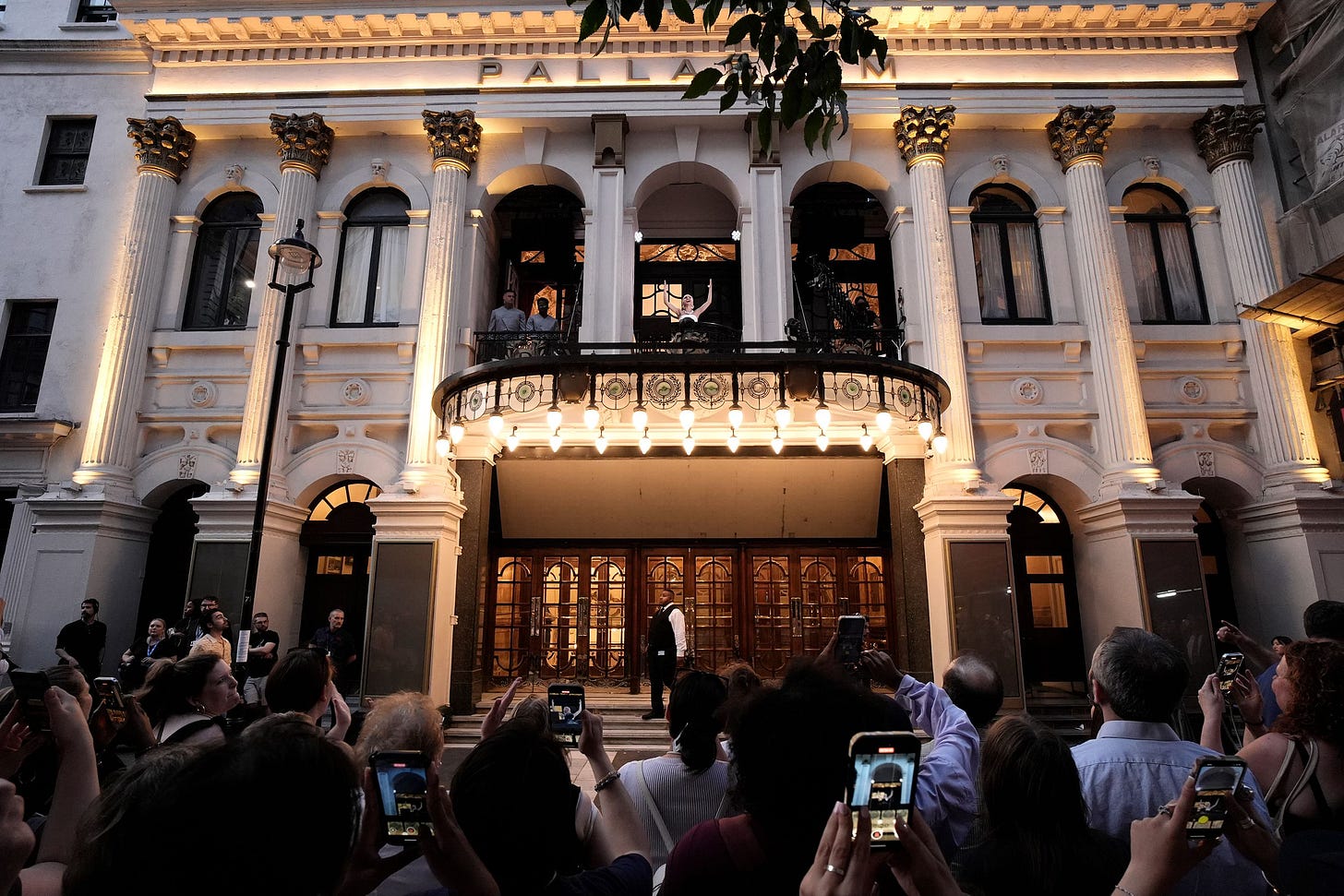REVIEW: Rachel Zegler in Jamie Lloyd's Evita at The London Palladium
This is Musical Theatre as a demonstration of power.
Eva Peron’s rise from illegitimate child to become First Lady of Argentina alongside is an expressions of power. Political, personal and sometimes physical power. She fought her way to General Peron, who became her husband, and then helped him harness the power of populism by courting the working classes and convincing them that their interests aligned with those of her rich spouse. It’s the populist playbook we see all over the world beautifully summed up in Sir Tim Rice’s lyrics for Eva;
“He supports you for he loves you, understands you,is one of you.
If not--how could he love me?”
There is a creative and political fire burning in the heart of Evita that has taken nearly fifty years to fully reveal but is now roaring, crackling and smoking in this incredible new production at The London Palladium directed by Director du Jour, Jamie Lloyd. There is nothing stripped back or minimalistic about this show; it is intense, it is loud and above all it is a SHOW. Like its subject, this Evita, is theatrical.
Soutra Gilmour’s set is an oversized set of grey bleachers, solid, and unmoving throughout the show like an outsize public building, constructed to dominate, to enforce and to demonstrate power through architecture.
The question that Jamie Lloyd directed shows force us to consider is; what is more important? 1500 costumes, lifelike drawing rooms on trucks , and painted flats or full on story telling?
Evita goes full on. A full stage width Argentinian flag hangs at the top of the bleachers. Our narrator, observer and conscience, Che, has it ripped away to reveal Eva Peron, stood in black bustier, hot pants and boots, in front of giant letters spelling out her name with the orchestra, cranked up to 11, behind her.
Rachel Zegler as Eva Peron is sensational. She exudes the star quality her character sings about, her vocals slip effortlessly and without break from belting chest to charged up soprano, she dances up a storm with the ensemble and her acting is on a par with the greats of the art form. She is determined, sexy and, that word again, powerful. This is a gritty, street fighting Evita ready and able to take on all comers. And it is not that Dame Elaine, Ms Lupone or Srta Roger were not as good; they just didn’t get the chance to come at this show so viciously and with such force although all three are forces of nature and the work they did built the foundation for Ms Zegler.
London has taken Rachel Zegler to its collective musical theatre heart and she has responded in kind with a performance for the ages.
She is not just energy; when Eva slows down, Zegler becomes weighed down, her physicality changes and during High Flying Adored we see her doubts and pain in close up.
I have seen three versions of this show; the UK tour based on the original Hal Prince production, the Broadway revival with Elena Roger and Ricky Martin and now this. When Ricky Martin played Che, we finally got rid of the Che Guevara stylings and saw Che, the common man in Argentina. The word Che is equivalent to ‘mate’ or ‘buddy’ but Tim Rice (whose elegant lyrics have never sounded so cutting), felt there was an opportunity to theorise a situation in which these two Argentinian icons met. It looked kind of cool in the late 70s and early 80s with the character dressed in a green military surplus jacket looking like some kind A-level sociology teacher. It stopped working long ago and the Che we see in this production shows us what we have been missing. And the actor who plays him, Diego Andres Rodriguez, is a revelation. He is dressed like a cholo, all in black with long cargo pants, a t-shirt and chains. He is cynical, charming and masculine. His acting and physical choices are brave, his voice is (again that word), powerful, resonant and expressive but, above all, he has presence.
Rodriguez’ Che is speaking for us, the people, los descamisados. He is not to arch like Patinkin or Englishly cynical like David Essex but instead is the real man on and from the streets. This performance marks the arrival of a true leading man who will be welcomed back to the West End with open arms for the rest of his career.
The third part of the leading trio is Juan Peron, Evita’s husband and erstwhile Argentine President. This part is usually played a bit too Rudy Giuliani for me. Peron always seems too old, his hair dyed black or combed over or both. Not here. James Olivas, as Juan Peron, is young, tall, handsome and incredibly muscular. ‘Yes’ you think ‘ Of course Eva would fancy him.’ Olivas plays the military man’s orthodoxy without appearing stiff, or boring. He is physical, he can dance, he can sing and when he engulfs Ms Zegler in his embrace for ‘You Must Love Me’ the strength of the couple’s love is the only illumination the stage needs.
Evita is unusual in that it has a male and female pair of less major characters who are not a couple. In this case they are both sexually used by the leads: Agustin Magaldi, played in rip roaring fashion by the wonderful Aaron Lee Lambert, was Eva’s ticket to the city and The Mistress who was displaced by Eva on her journey to the top is played by Bella Brown who takes us from acceptance to heartbreak to defiance and anger in the course of one song. Ms Brown will also be covering the role of Eva which will be well worth watching.
The ensemble in this show work their behinds off. Fabian Aloise’s choreography whips up shapes, moves and steps demanding athleticism, musicality and technique. His use of stillness punctuates and there are moments when sharp head turns are all that is needed. He also knows how to stage a BIG production number and the ending of Act One, A New Argentina, floods the theatre with energy, flags, banners and ticker tape, mimicking the worst excesses of populist politicians back in the 1950s and today.
This is a part of the show that I have not seen as developed before. It has always been about something that happened a long way away; Argentina is right at the end of South America. Jamie Lloyd, without labouring the point, shows us that this brand of populism, that tricks the poor and working class into believing its slogans is all around us.
Which leads us to the balcony scene and Don’t Cry For Me Argentina. This scene is based on a speech that Eva Peron gave from the balcony of the Casa Rosada in Buenos Aires. Jamie Lloyd has Ms Zegler head out onto the balcony at the front of the London Palladium, overlooking Argyll Street where a crowd of thousands of people gather nightly to see her sing the show’s most famous song. As she appears there is applause which morphs into respectful silence as she sings, before exploding into applause and even tears at the end of the number. It is extraordinary.
From inside the theatre we see her on a huge screen, dressed for the first time in the iconic white dress, with her hair bleached, regally gliding through the Palladium’s opulent upper bars out onto the balcony. We see the crowd waving and cheering. We see her alternately addressing the crowd below and the camera next to her. She is a stage star, she is a movie star, she is a star. Shots fade between Evita, the crowd and some of the ensemble who are also out on the street weeping. It is a moment that lifts what can be a dreary song into an iconic moment. Nothing is lost but much is gained. Those who disagree are, I’m sorry to say, wrong. Simple as.
The music has been newly arranged by Alan Williams and gives vibes of West Side Story with brass blasts, rich strings and rhythm arrangements that sound like they were created for choreography. Williams mixes these flavours with influences of Lloyd Webber’s original rock opera concept with some solid heavy metal guitar work shining through. The sound design by Adam Fisher is another expression of the power that obsesses this show, it is loud and bold and even frightening but so is populism. Jon Clark’s lighting is dynamic and forces us to watch the descent of power for power’s sake as it turns ugly and uncompromising.
Che is beaten and left lying downstage centre dripping with a bucket load of red blood mixed with blue and white Argentine flag coloured paint. We have all heard that refrain from populists; ‘if you oppose us, you oppose your country’ and, by extension you deserve to be badly treated or beaten or deported. Rodriguez’ Che forces himself off the bloodied floor to confront Evita in the final lament.
“The choice was mine and mine completely” sings Zegler, unapologetic as her character. Evita has not learnt anything, maybe she knows what she did was wrong but even at the end she still seeks acceptance and understanding from her sons and daughters of Argentina. “The choice was yours and yours alone” responds Rodriguez as Che before finding the last bits of breath left in his bloody body to deliver the final twist in Evita’s legend; the girl who came from nowhere to become First Lady of one of the world’s richest nations, who became a global icon and then died aged 33 was lost; her body went missing for 17 years.
Only the truly powerful can hold the public in a spell like the one Eva Peron cast, and only a truly powerful production like this can do the same to an audience, inside and outside of a theatre. Evita, the woman, affected people far outside the borders of her own country for many years and this production of Evita, the musical, will continue to reverberate, be talked about and to astound far beyond its 12 week run.
Find out more about Evita at The London Palladium and book tickets HERE







